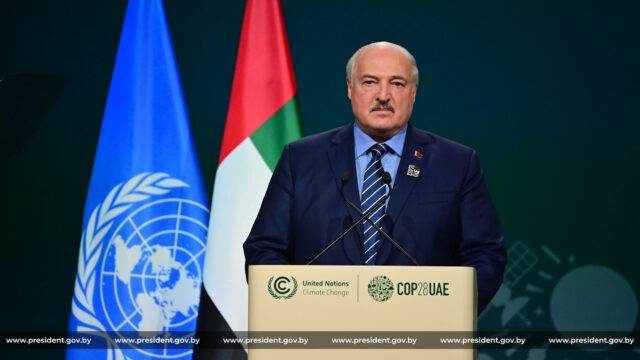
Political Rhetoric Overshadows Belarus’s Economic Reorientation Toward Russia
Publication: Eurasia Daily Monitor Volume: 20 Issue: 186
By:

On December 1, Belta, Belarus’s official press agency, admitted that President Alyaksandr Lukashenka seemingly went off script during his speech at the UN Climate Summit and “added sharpness to his presentation” (Belta, December 1). Lukashenka declared that repeatedly expressing concerns about climate change at a time when action on other, more immediate issues is sorely needed comes across as bogus (Belta, December 3). According to him, the West sparked the wars in Ukraine and Gaza and must wake up to that reality. Ending these conflicts would save Washington trillions of dollars that could then be used to prevent further climate change. The ongoing conflicts affect all facets of Belarus’s international standing, including its economic orientation. Russia’s war against Ukraine continues to reshape Minsk’s foreign relations. Yet, reported changes in the country’s economic ties have been more modest than the political rhetoric from Minsk might imply.
Lukashenka’s speech received a strong response. According to Belta, the Belarusian president’s words received a standing ovation from many of the summit’s participants (Belta, December 1). Only the Polish, Latvian, and Lithuanian presidents snubbed Lukashenka by refusing to pose with him for a photo with world leaders precisely over his support for Russia’s war effort (Regnum, December 1).
Some observers have questioned why Lukashenka continues to be included in UN-sponsored events due to his position on the war. During his bi-weekly question-and-answer session with Belarusian outlet Zerkalo, Artyom Shraibman, one of the leading voices among Belarusian journalists in exile, responded to a similar question, treating it as naïve. Lukashenka, as Shraibman explained, is shunned by only a couple dozen Western leaders, and his supporters at the Dubai summit far outnumber his detractors. He added that Lukashenka’s presence at the summit could not possibly make it any more scandalous, with major Emirati oilman Sultan Ahmed Al-Jaber presiding over the event. Shraibman shared his belief that some symbolic gestures from Western leaders toward Lukashenka, such as simply speaking to him, could lead to the release of political prisoners in Belarus. At the moment, little, if any, political will seemingly exists on either side to resolve that situation (YouTube, November 29).
The issue of talking to and trusting Lukashenka figured prominently in a discussion held by the Belarusian service of Radio Free Europe/Radio Liberty on November 27. Volodymyr Fesenko, head of the Ukrainian Center for Applied Political Studies, and Pavel Slunkin, a former Belarusian diplomat, now an advisor at the European Council on Foreign Relations, acknowledged they do not trust Lukashenka. Unlike his Belarusian counterpart, however, Fesenko repeatedly pointed out that the Belarusian president is not merely Russian President Vladimir Putin’s stooge but has some room for maneuver (see EDM, October 25). The Ukrainian analyst also mentioned that Lukashenka has upheld his pledge to Ukrainian President Volodymyr Zelenskyy on the first day of the Russian invasion that the Belarusian army would not participate in the war. Likewise, Belarus’s suspension of shelling Ukraine in October 2022 is considered to be the result of Lukashenka’s efforts. Even Slunkin conceded that may be the case. The two also discussed why there have not been regular contacts between the Ukrainian leadership and Svetlana Tikhanovskaya, leader of the Belarusian opposition-in-exile. This was attributed to Kyiv’s reluctance to upset Lukashenka. In the words of Fesenko, “Just so there would be no assault and no shelling from Belarus makes it worth delaying the recognition of Tikhanovskaya” (Svaboda, November 27). A tentative takeaway from this discussion is that Lukashenka’s agency is still alive, though curtailed by Moscow.
Belarus has continued moving increasingly closer to Russia out of sheer economic necessity (see EDM, April 24, May 4). The Union State’s new “integration package” for 2024–26 was recently prepared with this reality in mind. It consists of 11 sections and 120 tasks, with significant portions devoted to uniform rules for economic competition, protection of consumer rights, and the creation of a unified transport and energy system (RIA Novosti, November 29). The Belarusian information technology sector, which used to work almost exclusively on subcontracts with the United States and West European companies, is now “gradually reorienting” toward Russia. In 2023, over $600 million in revenue for this sector will come from Russia. Belarusian companies have succeeded in filling the niches Western firms abandoned in the Russian market. Only 32 Western businesses have closed shop entirely, while most have hired Russian management teams. To make up for the closures, 27 new brands entered Russia, mostly from Türkiye, Lebanon, and Belarus. Two Belarusian businesses, Swed House and Good Luck, are now filling the void left by IKEA. When Women’secret left Russia, it soon reappeared using Belarus’s Fashion House as a front (ILEX.by, October 3).
The reshaping of Belarus’s economic orientation does not always favor Russia, as Minsk resists where it can. Of the Russian firms that tried to fill identical niches abandoned by Western firms in Belarus, only about 20 have succeeded. Many others fell victim to Minsk making it exceedingly difficult to withdraw shares of companies from “unfriendly” countries. Whereas about 20 percent of all Western businesses in Russia left after the war in Ukraine began, Belarus only saw about 5 percent exit the country. When McDonald’s left Belarus, Russia’s Vkusno i Tochka (“Delicious, Full Stop”) tried to fill the void. Minsk, however, preferred to transfer it to the Belarusian company Mak.by. Olga Loiko, a Belarusian economist, now in exile, writes, “Even under international isolation, Minsk is not allowing the uncontrolled outflow of Belarusian assets into Russian hands” (Carnegie Politika, November 29). This reality underscores that, while still significantly limited, official Minsk maintains some geopolitical room for maneuver in economic relations with Moscow.



